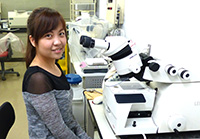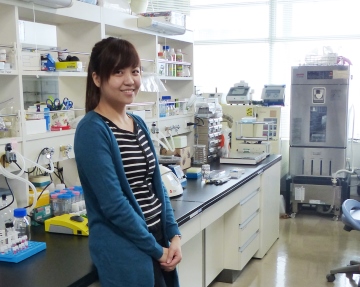May 15, 2015
Engineering plants for large-scale bioproduction
Jo-Ann Chuah, Postdoctoral researcher

Enzyme Research Team, RIKEN Center for Sustainable Resource Science
Please describe your current research.
The Enzyme Research Team seeks to develop functional materials. I am contributing to this goal by studying the structural and biological properties of biopolymers to design peptide-based vectors that can deliver foreign genes to plant cell compartments through a process known as transgenesis. The resultant transgenic plants could be used in the large-scale production of valuable chemicals for the pharmaceutical industry. By developing a simple, reproducible and efficient method for generating transgenic plants, I hope to bring us closer to establishing such biofactories.
How did you become interested in this field?
Peptides are naturally occurring molecules that regulate a wide range of biological processes. Synthetic peptides have also been engineered for use in applications such as adhesives and cosmetics. I find it fascinating to work with these versatile building blocks and tailor their properties to perform different functions.
What excites you the most about your current research?
Recently, my colleagues and I devised a simple peptide-based vehicle that could effectively introduce plasmid DNA to the mitochondria of living plants. Other members of our team have used peptides to successfully transport genetic material across cellular and subcellular membranes. Simply by linking different amino acids together, we can create peptide chains with specialized characteristics. I am excited about exploring the endless combinations to create new tools that can perform many functions in living systems.
What made you decide to become a scientist?
I have always been interested in science. As a teenager, I was engrossed by television shows of sharp-eyed forensic scientists collecting evidence or analyzing samples using high-tech gadgets to put criminals behind bars. In the first year of my undergraduate degree, I took a course on recombinant DNA technology, which convinced me to take up a career in science.
What has been the most interesting discovery in your field in the last few years?
Recently, a team of researchers announced that they had engineered rice plants to carry out photosynthesis more efficiently, which could substantially increase crop yields to feed a rapidly growing population. I am eager to see how the technology we have developed can be applied to plant genetic engineering, and where it will take us.
What is the best thing about working at RIKEN?
 © 2015 RIKEN
© 2015 RIKEN
The RIKEN Yokohama Campus operates a shared facility that houses a 900-megahertz nuclear magnetic resonance spectrometer. I have used the remarkable instrument and associated expertise in my research to determine the atomic structure of peptides. I am greatly impressed by the access to such cutting-edge research facilities, sufficient funding and the freedom to choose our own research focus, even for junior researchers like myself.
What do you wish you had known before coming to RIKEN and Japan?
Coming from Malaysia, I wish I had known that I did not need to worry about the language barrier—it certainly has not affected my ability to make friends in Japan from day one.
Please tell us about your professional and personal goals.
My goal is to learn something new every day.
